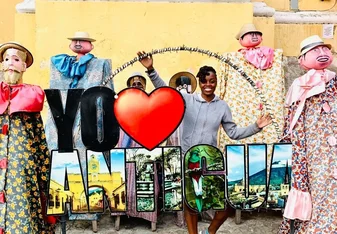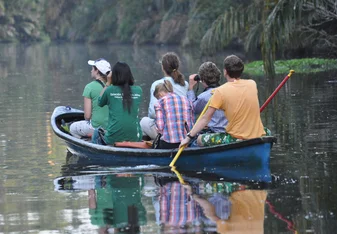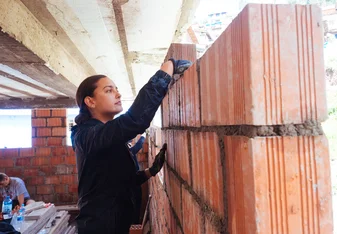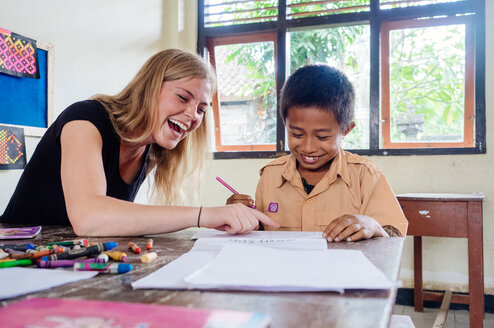YWF-Kido Foundation: Marine Turtles Conservation
About Program
Join the YWF-Kido Foundation to make a difference in Grenada! Located at the Kido Ecological Research Station (KERS) in Carriacou Island, we are looking for Volunteers to participate in Kido Foundation Sea Turtle Monitoring and Tagging Programme.
Volunteers will actively participate in monitoring and data-collection of 2 critically endangered Sea Turtle Species, Leatherback and Hawksbill, nesting on 3 different beaches on the Island; helping to prevent poaching activities of turtles and eggs. (From March to August)
Duties:
- Night patrolling in the High North proposed National Park area, from 8pm to 6am, 5 nights a week.
- Assisting local guides tagging post-nesting turtles, carapace measuring & other data collection, and turtle tracks and nests disguising


















Response from YWF-Kido Foundation
Chloe arrived before Cassie to volunteer for KIDO Nesting Sea Turtle Monitoring program 2017 and in the beginning she seemed a diligent person, though pretty childish.
She reported that she had a weird panic-attack in her room one night, after taking one dose of Benadryl for mosquito bites – she said that she went to bed forgetting to put on the fan –which keeps mosquitos off- waking up not knowing where she was in the dark and somehow, in her panicky state, she managed to break one of her bedroom top glass window slats, slightly wounding her hand. She had not informed us until the next morning after she had already communicated with her mom in the US via Skype (we live in a different bungalow 100 feet away) and she agreed to get rid of the leftover Benadryl drugs!
We purchased for Chloe mosquito repellent, sold in the local pharmacy ( DEET is banned by sea turtle conservation organizations working towards not destroying sea turtles, eggs and developing embryos with chemical poison) and, when asked, she said that this product was working well.
The real trouble started when Cassie arrived. We noticed right away her fleeting attention span of 2 seconds and Chloe began to fall in the same pattern of her roommate. Within few days we knew that we were dealing with two young ladies with the emotional intelligence level of 8 year olds. Cassie was playing the leader and Chloe the foot soldier, revealing her gregarious personality. We still had some hope that Chloe would have a mind of her own and we told her in private several times to be in charge, not to follow passively every one of Cassie’s decisions because her newly acquainted ‘friend’ could lead her into trouble. She said to us: ‘Yes, I already gathered that’… but in reality she did the opposite.
No matter the amount of training we did on nesting turtle beach procedures/protocol and personal safety on the field, as guests in a foreign country and representing KIDO in the eyes of public opinion, both girls got it all wrong… as became painfully obvious to us later on.
We need to underline here that KIDO is our home and a safe haven for guests, our isolated location keeps away human intruders and our dogs (RESCUED from puppy mills, abandonment and starvation) thank us back by guaranteeing the safety of the property.
Unfortunately, these two young ladies (not minors) twisted and distorted in their mind the reality around them, helped by their fervid imagination (close to hallucination), irrational fears to their own convenience.
Their two posts reveal a mixture of misunderstanding, misrepresentation, false perception of their surroundings, willful ignorance of social issues and, of course, lies.
Could Chloe’s fixation on sex related issues come from melting together in her brain of topics discussed about safety? (by the way, NOBODY took away the water bottle from Chloe!). How can she otherwise misinterpret serious instructions about precautions and safety behavior in order to protect them when on their own with talks 'about' sex? Either her mind had already a fixation/problem about this or she simply refuses to enter the information in her own mind, twisting meanings and words out of context.
The two never managed to patrol the beaches with our turtle guide/volunteer body guard for 5 days in a row (as required and agreed upon) and the total hours Chloe’s claimed to volunteer were much less, because either they were tired or booked other engagements for visiting the surrounding islets, going to evening party/events, etc…
They were tired because they did not get enough sleep during the day since every morning they were hiking down and up of 1/2 mile of trail to reach a beautiful secluded sandy beach nearby our Station to get a tan, a main focus of their stay at Kido. In fact, Cassie (the spokesperson of the two) told us that they could not avoid to go to this beach every day, instead of resting, as we were suggesting, and that her aim was to become ‘blond, thin and tanned’. Sadly, Chloe followed her.
We also found out, after they left, that the two were also not eating sufficient food because they wanted to be slimmer/ skinnier! This is not a crime but when you are participating in a rigorous conservation program that is physically demanding this can provide additional concerns, increased health risks and mental instability. Both needed to be more observant of their surroundings, about their intentions for participating in this program and more personally aware/ responsible for their own wellbeing. Malnutrition, dehydration and overexertion can be fatal in a program such as this easily turning a tiny slip/ trip into a terrible accident halting all monitoring efforts for the night or possibly much longer than that.
Carriacou is one of the safest social environments we have ever known, people are friendly and helpful when you are in need, but, as elsewhere in the world, one encounter with a rogue person with bad intentions can really spoil your stay, get you into a dangerous situation and possibly ruin your life. This is why, looking at these two unaware, unconcerned, living in their own bubble, overaged teenagers, we were worried about their safety when they decided to wander alone out of our station; this is why we encouraged our local guide to accompany them as much as possible, even outside patrol time. An extra responsibility to help ensure their safety and wellbeing outside of his normal responsibilities to be their bodyguard during turtle patrol time. He accepted, though he has a family of his own (wife and two children). They did not need to call him to go to town for groceries, they came with us, except one day when we could not go in the afternoon and we asked them to come with us in the morning… but their priority was already set, in the morning they were to go to the secluded beach to swim and get tanned. Note that KIDO station has a 100 steps stone path leading to KIDO bay, where you can safely swim, a 5 minute walk… but, ouch, this is not a sandy but a stony beach!… and from KIDO to the nearest village, where there is a bus stop to town, it is a 10 minute walk, less than a ¼ of a mile (check Google map). There volunteers can take a bus for 3 EC or 1$ USD the remainder of the trip into Hillsborough to do any shopping they may need.
We delivered them a clean house and they left this house, where they were living for approximately two weeks, as a dump! Lacking the skills for basic cleaning, they put the blame on wildlife wandering in the house: house geckos, a standard feature in Caribbean homes (no more than a few inches long), were suddenly transformed by their imagination into iguanas (at least 3 feet long)! ‘Mammoth’ moths (not larger that the palm of a hand) were suddenly the target of irrational fear and rats/mice… right. Why these creatures ‘invaded’ the house?... Well, we discovered, with disgust, after they left, that Chloe and Cassie (or one of them) were throwing out of the kitchen window leftover food, vegetable and fruits peels and seeds, etc… against our precise instructions to store all the food supply in the fridge and give the leftovers to the dozens of wild land tortoises in the bush, but away from the house.
No wonder that this uncivilized procedure attracted 'unwanted' guests!
Precautionary tales that escaped their twitter attention span range possibly? and here we can break the news that the animals are never to blame for infestation. The people that leave leftover food outside of their tent while camping are to blame for attracting the unwanted attention. If there were perhaps bears in these woods like at many other camping destinations up in North America or other parts of the world maybe our requests to place biodegradable edible remains away from your residence would not have been so easily overlooked.
The ‘unsanitary’ resulting conditions were therefore the results of the inability of Cassie and Chloe to cope with basic cleaning. By the way, our present volunteer keeps a spotless house (the same) and we receive not one complaint about wildlife intruding in the house.
Finally, and most important, the report from the field was damning. Cassie and Chloe tried, with their selfish and egocentric behavior, to jeopardize our turtle conservation program by not following our specific instructions:
-shining the bright headlamp lights all over the beach and the sea, scaring off would-be-nesting turtles (this is why when the patrol team was not on the beach the turtles were coming, happy to find a quiet and dark spot to nest);
-not willing to patrol the beach at the scheduled time, at least every hour, especially Chloe (because of course they were too tired);
-having TANTRUMS and RAGE FITS at the slightest criticism (Cassie) while collecting data and when a turtle was nesting, therefore obliging our guide to stop his monitoring work to deal with this nonsense, therefore disturbing the nesting process;
-never assisting our guide erasing turtle nest and tracks, a necessary tiring task to camouflage the nest so morning poachers could not locate them.
-refusing to monitor in the early morning two smaller beaches (as agreed upon) to erase turtle tracks against poaching… because, again, they were too tired! So, since one of these nesting beaches was precisely the same where our deflated tire ladies hiked to to get suntanned in the day, they were literally ignoring patrolling for nesting tracks while being there for hours on end..
So much for loving turtles!
Worst of all we had been told (after they left) that these two young ladies asked our guide if they could bring two newly acquainted local guys to the beach in the night with them to watch turtles. Our guide, who could not really know how to deal with their above mentioned breaking rule behaviors, this time said a firmly NO, because he knows very well KIDO’s first rule that is we do not bring unaffiliated guests to patrol at night unless it is agreed upon firstly with the KIDO Foundation directors specifically. We cannot stress to our volunteers enough that YOU NEVER TELL OTHER PEOPLE WHAT YOU ARE HERE FOR , WHAT YOU ARE DOING, WHERE AND WHEN YOU GO TO THE BEACH (unless you are introduced by the directors to particular persons such as biologists/ volunteers or project assistants), especially as you venture around the island for sightseeing, grocery shopping and other events/ activities where the KIDO directors are not present with you.
So Cassie and Chloe were talking freely to male strangers about what they were doing, where and when.
Unless we introduce the volunteers personally to friends and trustworthy persons, the volunteers cannot possibly know who to trust in a new foreign social context. These guys they met on the street or events/parties ask to come to the beach for two reasons, either to poach turtle eggs when the patrol team is gone or because they are attracted to the female volunteers. So, once again, these two ‘volunteers’ broke our rules and acted in a very foolish way, jeopardizing our conservation work and placing themselves in a possibly dangerous situation. The guide reported that he knew that one of the fellows was not a good person to bring around at night.
Just this breach of trust would had been a very serious reason, if we had known in time, to expel Cassie and Chloe from KIDO and the beach monitoring task.
And they have the gall to ask why we did not thank them for their ‘volunteer’ time? Why we did not go to say goodbye when they were leaving?
There was also another incident involving local guys. After one day spent in the South of the island on another tourist advertised beach, on a Sunday, while waiting for a bus, they asked almost everyone with a car passing by to get a ride to KIDO. They call us while we were out in the North of the island on an educational field trip with children. We told them to wait in town for us, once our field trip was over. In the end they got a bus ride, but the result of their ‘advertising’ their stay location was that two guys with a taxi car appeared at KIDO gate next morning clearly looking for the two girls while they were going to their preferred secluded beach. This had never occurred before given the difficult dirt road to reach the forested property of KIDO. After 27 years we can tie the dots alright and pretty quickly detect fibbles, especially late teenage fibbles.
We do not need these kind of ‘volunteers’, they do not have the faintest idea what volunteering means and have no interest in learning important facts of life that do not fit in their bubble or know-it-all mindset.
Sadly, they lie to themselves, to their parents and then to us. We suspect that in reality their claimed ‘interest on turtles’ was just an excuse to have a cheap holiday, dressed up with a little conservation work adapted to their conveniences (that turned to be destructive for nesting turtles and for KIDO conservation work), have a good time and meet guys. They would build up a ‘good’ excuse for their parents and for us in order to leave the KIDO compound and roam freely around the island out of our guidance. By the way, one last little gem of a sentence from Cassie, who, after she watched online the photo of our RA due to arrive in June, she exclaimed: ‘How cute! I wish I could stay longer at KIDO to meet this guy!’. So, suddenly all the ‘horrible living condition at KIDO’ disappeared as long as she could meet our Research Assistant. Is this not also a sexist remark?
Suggestion for their parents: Cassie and Chloe are a liability for an organization like ours trying to preserve our precious environment and wildlife and they could get into trouble easily in a foreign environment. Please keep a watchful eye on them, verify if what they tell you is the truth or keep them home, if you can. They have not fledged yet!
For future volunteers: we had dozens of really great volunteers at KIDO, some returning year after year, dedicated to save our endangered species and we thank them from the bottom of our heart for their efforts and taking their time to help us, but, if the priority of volunteers-to-be is not the conservation of sea turtles, but just having a good time, please stay home or book in a five-star hotel, if you can afford it. Do not waste our time and jeopardize our program. Thank you!
PS: we apologize for the late response, but we have important conservation work to do here that needs attending.